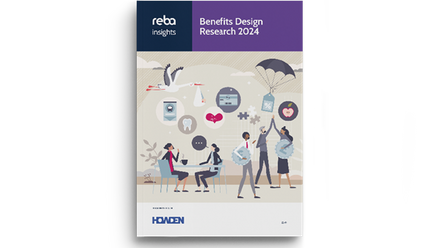How colleagues, managers and reward teams can support staff through the menopause

Menopause at work – why does it matter?
- The average age of menopause is 51, with women usually experiencing their menopause transition between the ages of 45-55.
- Three-quarters of women will experience menopause symptoms, including hot flushes, tiredness, poor memory, brain fog and anxiety.
- A staggering 63% of women going through the menopause say their symptoms have a negative impact on their work, according to a 2019 survey of 1,000 women by Forth with Life.
The tide has turned on menopause. With more women working through the menopause than ever before, workplaces are much more open about the impact of this life stage, not just on menopausal women, but their colleagues too.
According to a recent survey, 37% of organisations are considering offering menopause support in their workplace in the next two years. Are you one of them?
Here are some top tips from Kathy Abernethy, director of menopause services at Peppy and immediate past chair of the British Menopause Society, for you and your colleagues.
Here are our tips for HR professionals:
Define a pathway
“For a company to be menopause-friendly, a clearly defined menopause pathway is essential. Colleagues need to know how to access the right support and who to ask for it if they are struggling – at any level in the organisation,” says Abernethy.
Once the pathway is in place, it’s vital that all colleagues and particularly line managers are aware. “If someone plucks up the courage to speak about menopause, but their line manager is clueless as to what their options are, that's not constructive”, says Abernethy, so invest time and training to make the most of the initiatives you put in place.
Consider a pathway of specialist support. 90% of employees who attended a one-to-one menopause consultation offered by an employee benefit felt their symptoms were less bothersome.
Be open to reasonable adjustments
Staff may find small changes to their work conditions really make a difference to managing their symptoms better. “Look at the possibility of flexible working and being able to work from home. Adjustments within the work environment, like sitting next to a window in an office or moving from an enclosed space at work to one that is more open and airy, can allow your staff to thrive,” advises Abernethy.
Ask your colleagues what they want
Two years ago, Santander UK invited all female employees to respond to a survey, including a series of questions about menopause. Today, thanks to the initiatives the organisation has in place, Santander UK has been recognised in The Times Top 50 Employers for Women 2021 for its efforts to work towards gender equality.
After just four weeks of receiving specialist menopause support, 90% of participants from Santander UK felt more positive about their employer, and 76% said that their menopause symptoms had improved – proof that menopause support is good for your business as well as your people.
Address your uniform policy
“If you're in a uniformed organisation, think about whether the uniforms are flexible enough to adapt,” says Abernethy. “The police force provides uniforms with natural fabrics during menopause. Many companies’ uniforms are made from man-made fibres, which tend to make hot flushes and sweats far worse. If this is the case, issuing extra uniforms will mean menopausal staff can change if need be.”
Here are our tips for line managers:
Educate yourself
In order to have conversations about menopause with confidence it’s essential to know the facts. This means understanding the symptoms as well as being aware of what menopausal staff may need.
“As a manager you should be able to understand the basics and how symptoms can impact on workplace wellbeing,” says Abernethy. The CIPD’s Guidance for Line Managers is a great place to start, or look to organise line manager training with Henpicked: Menopause in the Workplace.
Stick to what you know
Research from Bupa has shown that almost a million women have left their job because of menopausal symptoms, so be understanding. “Remember that a team member is not coming to you to solve their hormonal problems – but to solve their work problems. Don't worry if you don't know about treatments, just focus on supporting the employee at work,” advises Abernethy.
Have an open door policy
Those who have learnt to manage their menopause symptoms whilst working from home are more likely to be suffering from back to work anxiety post lockdown. You can help by simply listening.
“Most women going through the menopause know exactly what needs to be done to make their working day more tolerable,” says Abernethy. “It’s their manager’s role to listen and to implement the change. Listen and be open to making it happen so your team can thrive.”
Here are our tips for colleagues:
Cut the jokes
Joking about the menopause is no longer acceptable. “Menopausal women may joke about it themselves of course, but colleagues need to avoid the constant references to hot flashes and ‘senior moments’ that can make women feel self-conscious and may add to their stress and anxiety.” says Abernethy.
Give them space
Staff going through the menopause need literal space within the office environment, but also figurative space. “If they’re suffering from brain fog and memory loss, the worst thing to do is apply more pressure, because actually that will just make it worse,” says Abernethy. “Give them a bit of time to gather their thoughts and they’ll be just fine.”
Be kind
Just bringing a glass of water or opening a window at a key moment could make a difficult moment easier, so be compassionate. Hormone fluctuations, stress, body image and symptoms can have a negative impact on emotional and mental wellbeing during menopause. “It’s not an illness, it’s a life event and one that requires a little understanding,” says Abernethy.
Be a menopause champion
Talk to other colleagues and encourage the set-up of a virtual support channel or an in-person Menopause Café at the office. Strength comes in numbers and by fostering a culture of openness you’ll help your organisation understand the extent to which menopause is impacting the business.
Magic Circle law firm Clifford Chance launched Peppy Menopause support after three colleagues individually approached their management team asking about menopause support. Speaking up can make a difference!
Menopause support is an issue for everyone. There has never been a better time to take action to support staff going through this life stage.
The author is Marina Gask, copywriter for Peppy.
This article is provided by Peppy.
In partnership with Peppy Health
Peppy is a next-generation solution that's transforming digital healthcare.







